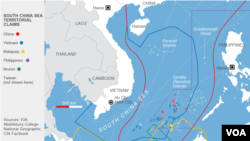China's newly-announced plan to stage its first joint naval drill with Russia in the South China Sea has analysts wondering: where exactly in the sensitive region will the exercise take place?
The Chinese defense ministry kept the world guessing when it made the announcement last Thursday, providing few details beyond saying the drill, codenamed "Joint Sea-2016,” will happen in September.
"The specific location is going to be very important in determining just how controversial this drill is," said Shannon Tiezzi, editor of the online news site The Diplomat, on this week's VOA China 360 podcast.
China has been engaged in decades-long disputes with five smaller neighbors who challenge its claim of sovereignty over most of the South China Sea: Brunei, Malaysia, the Philippines, Taiwan and Vietnam.
An international court in The Hague rejected China's sovereignty claims on July 12, but Beijing vowed to ignore the ruling.
WATCH: The South China Sea dispute explained:
Drill scenarios
Tiezzi said Beijing might avoid the ire of its neighbors if it holds the joint exercise with Moscow off the coast of the southern Chinese island of Hainan.
"China has held many drills very close to Hainan, where there are not any territorial or maritime disputes because it is so close to undisputed Chinese territory and longstanding Chinese military bases,” she said. "However, if the drills start moving south toward the disputed Spratly Islands and make use of some of the new facilities China has built there, that would be much more of a warning sign for the international community."
Beijing has turned several Spratly islets that it has long occupied into artificial islands in the past year, using land reclamation to build military-capable runways and ports. Those reclamations have drawn criticism from the Spratly Islands' rival claimants and from the United States, although Washington has said it is neutral on the competing maritime claims and wants them to be resolved peacefully.
If Beijing wanted to stage a joint exercise close to disputed South China Sea archipelagos such as the Spratlys or the Paracels, would Moscow agree?
China recently has been touting what it sees as Russian support for its South China Sea stance. In April, Chinese state media outlet Xinhua "applauded" Russian Foreign Minister Sergei Lavrov for criticizing efforts by some regional governments to internationalize their maritime disputes with China. Beijing has opposed such efforts because it prefers to negotiate with its weaker rivals one-by-one.
Russian dilemma
But Russia, like the United States, also has called for a diplomatic solution to the South China Sea disputes. One of the parties involved, Vietnam, has been buying Russian weapons since the Cold War.
"If Russia is seen as siding too much with China, that is going to upset Vietnam,” said Tiezzi. "There already is a sense that because of Russia's neutrality on the South China Sea issue, Vietnam now is turning to the United States for security support and jeopardizing Russia's relationship with a longstanding security partner."
Moscow also faces pressure to stay on good terms with Beijing as the two sides deepen their security cooperation, which included joint drills in the Mediterranean, the Black Sea and Sea of Japan in 2015.
Tiezzi said Russia has a common desire with China to prevent the United States from having unopposed global leadership. She said that desire trumps Russia's interest in the South China Sea, a region it does not see as vital to its security.
The Diplomat editor said Moscow's ambivalence toward Chinese claims in the South China Sea is similar to Beijing's reaction to the Russian annexation of Crimea in 2014, when Crimeans voted in a Russia-backed referendum to secede from Ukraine.
"China was not thrilled, because from its point of view, allowing a group of people to choose to leave a country sets a very dangerous precedent,” she said. "But at the same time, it was not a vital interest for China's leaders, and they thought they saw more benefit by at least giving Russia the appearance of support."
Win-win option?
One way for Russia and China to satisfy each other's needs in the South China Sea could be to stage September's exercise close to Hainan.
"If we see the exercises only taking place in undisputed areas, that would be Russia walking its fine line,” said Tiezzi. "That would allow China to say, 'Look, we held a joint exercise with Russia in the South China Sea,' while Russia can say, 'Yes, but this is in undisputed international waters, or waters where China has maritime control.'"










